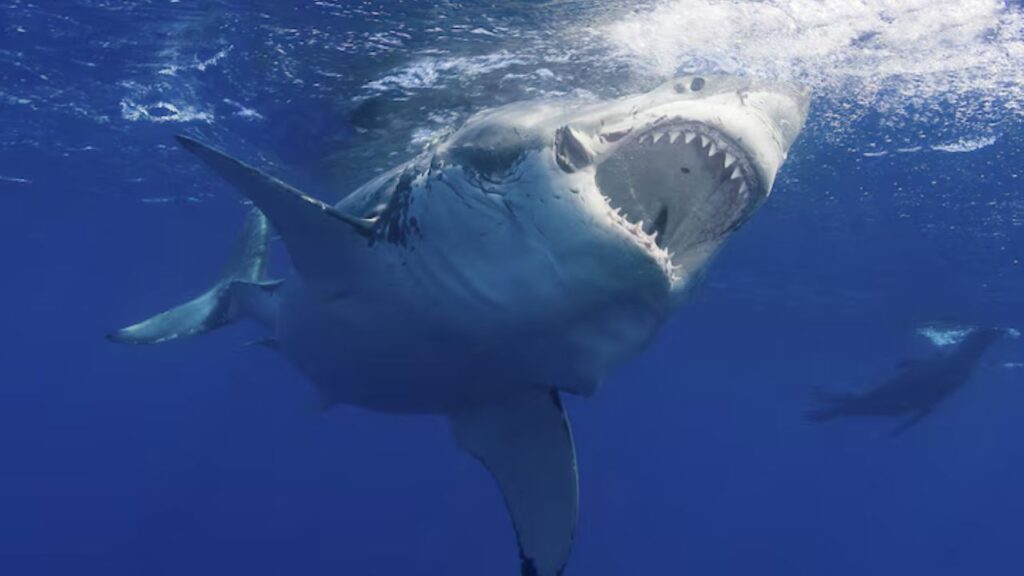Why Do Great White Sharks Attack Humans? Great White Sharks primarily attack humans out of curiosity, mistaking them for prey like seals, and due to their exploratory nature.
The Great White Shark, often dubbed the “White Death” or “Man-Eater,” has instilled fear in the hearts of beachgoers worldwide.
Known for their power, size, and razor-sharp teeth, these apex predators have been a staple in horror films and sensational news reports for decades.
However, despite their fearsome reputation, the truth behind Great White Shark attacks on humans is far less sinister than popular culture would have us believe.
These attacks are infrequent, and research shows they are often not deliberate acts of predation. [Why Do Great White Sharks Attack Humans?]
In this article, we’ll dive into the science and motivations behind these rare encounters, dispelling common myths and exploring how humans and Great Whites can safely coexist in shared environments.
Contents
What Are Great White Sharks?
Physical Characteristics
Great White Sharks, scientifically known as Carcharodon carcharias, are truly impressive creatures. They can grow to a length of 20 feet or more and weigh over 5,000 pounds.
Their powerful bodies are built for speed and strength, enabling them to surge through the water at speeds up to 35 miles per hour. [Why Do Great White Sharks Attack Humans?]
Equipped with rows of up to 300 serrated teeth that are continuously replaced throughout their lifetime, Great Whites are incredibly well-adapted for hunting.
They also possess highly developed sensory systems, including the ability to detect minute electrical signals through organs known as the ampullae of Lorenzini, which help them locate prey even in dark or murky waters.
Habitat and Diet
Great Whites are found in nearly every ocean, particularly favoring coastal areas with water temperatures between 54 and 75 degrees Fahrenheit.
They are most commonly seen off the coasts of South Africa, Australia, California, and Mexico. [Why Do Great White Sharks Attack Humans?]
Their diet primarily consists of marine animals such as fish, seals, sea lions, and even small whales.
Interestingly, as Great Whites mature, their diet shifts from fish and smaller prey to larger marine mammals, which provide them with the high-fat content necessary for their large bodies and high energy requirements.
Do Great White Sharks Intentionally Target Humans?
The perception that Great Whites are aggressive predators that seek out human prey is largely a myth perpetuated by media portrayals and shark-themed horror movies.
In reality, scientists agree that Great Whites do not actively hunt humans. [Why Do Great White Sharks Attack Humans?]
Unlike seals and sea lions, humans do not offer the fat-rich diet that sharks need. Many shark attacks are what researchers call “test bites” or “exploratory bites,” where the shark takes a bite to investigate an unfamiliar object.
Often, once the shark realizes that the human is not its usual prey, it will release the person and swim away. This tendency has led many experts to conclude that Great Whites rarely see humans as a desirable food source.

Why Do Great White Sharks Attack Humans?
Mistaken Identity
One of the primary reasons behind Great White Shark attacks on humans is mistaken identity. [Why Do Great White Sharks Attack Humans?]
When viewed from below, a swimmer or surfer on a board may resemble the silhouette of a seal or sea lion, especially in murky water or low light conditions.
From the shark’s perspective, the shape and movements of a person paddling on the surface can mimic those of its natural prey, leading it to approach and potentially bite out of confusion.
Researchers have noted that the majority of shark attacks on humans happen under these specific conditions, lending credence to the idea that mistaken identity plays a significant role.
Curiosity and Exploration
Like many large predators, Great Whites are curious creatures. Because they lack hands or other appendages, sharks use their mouths to explore unfamiliar objects.
This “bite first, ask questions later” approach can lead to unfortunate encounters with humans. A Great White’s exploratory bite can cause significant injury, given the size and power of its jaws.
However, once the shark realizes that the object of its interest is not edible or desirable, it often releases its grip and swims away. [Why Do Great White Sharks Attack Humans?]
This behavior is not limited to humans; Great Whites are known to test-bite various objects, including buoys, boats, and debris floating in the water.
Environmental Changes
Human activities have significantly altered marine environments worldwide, impacting the behavior of many ocean species, including sharks. [Why Do Great White Sharks Attack Humans?]
Coastal development, pollution, and overfishing have depleted some of the Great White’s natural prey, forcing them to explore new areas for food.
As a result, sharks may be more likely to venture into coastal waters where humans swim, increasing the chances of accidental encounters.
Additionally, climate change has led to shifts in ocean temperatures, which can affect shark migration patterns and bring them into closer proximity with humans than in previous decades.
Territoriality and Defensive Behavior
While Great White Sharks are not typically territorial towards humans, they may display defensive behavior if they feel threatened or are protecting a food source.
Instances where people unknowingly approach a shark that is feeding or in a heightened state of arousal could provoke a bite response.
Although these situations are rare, it is crucial for divers and ocean-goers to understand shark behavior and maintain a respectful distance when in the water with these animals.
Misconceptions About Great White Shark Attacks
The widespread belief that Great Whites are aggressive towards humans is largely unfounded. Most attacks are non-lethal, and in many cases, the shark retreats after a single bite. Statistically, shark attacks are rare occurrences.
According to the International Shark Attack File, there are about 70-80 unprovoked shark bites reported worldwide each year, and only a small percentage of these involve Great Whites.
Additionally, humans are far more likely to be injured by other animals, such as dogs or even cows, than by a shark. [Why Do Great White Sharks Attack Humans?]
These misconceptions have led to a negative portrayal of sharks, with people often viewing them as mindless killers.
This fear has, in turn, led to the targeting and hunting of sharks, sometimes even out of a desire for vengeance following an attack.
However, it is essential to remember that Great White Sharks are vital to the ocean’s health and ecosystem balance. Rather than seeing them as threats, we should strive to understand and respect them.
Preventing Shark Attacks
Behavioral Tips for Swimmers and Surfers
Reducing the risk of shark encounters involves taking a few practical steps:
- Avoid Wearing Shiny Jewelry: Reflective objects can resemble fish scales, attracting sharks.
- Stay in Groups: Sharks are less likely to attack a group than a solitary swimmer.
- Avoid Swimming at Dusk or Dawn: These are prime feeding times for sharks when visibility is low.
- Do Not Enter the Water if Bleeding: Sharks can detect even trace amounts of blood, which may attract them.
Technological Advancements
Recent technological developments are providing new ways to protect beachgoers from shark encounters. [Why Do Great White Sharks Attack Humans?]
Shark deterrents, such as electrical shields that emit a pulse to deter sharks, have been proven effective in some situations.
Additionally, drones and other surveillance tools are being employed to monitor shark movements along popular beaches, giving lifeguards and swimmers timely alerts if a shark is spotted nearby.
Public Awareness and Conservation Efforts
Public awareness and education are crucial for reducing the fear of sharks and promoting conservation efforts.
By understanding shark behavior, we can reduce unnecessary fears and improve safety practices. [Why Do Great White Sharks Attack Humans?]
Conservation groups also play a vital role by protecting shark habitats, regulating fishing practices, and advocating for laws that prevent the overexploitation of shark populations.
Public outreach and educational campaigns can help demystify sharks, showing that they are not mindless killers but important members of the oceanic ecosystem.
Final Verdict
In most cases, Great White Shark attacks on humans are the result of curiosity or mistaken identity rather than aggressive intent.
These magnificent creatures are essential to the health of the marine ecosystem, serving to regulate the populations of various marine species.
While it is natural to fear sharks due to their size and power, it is essential to remember that attacks are rare and rarely fatal. [Why Do Great White Sharks Attack Humans?]
By taking simple precautions and educating ourselves about shark behavior, we can minimize the risk of encounters and coexist with Great Whites safely.
Protecting these apex predators is not only a matter of respect but also a necessary step toward preserving our oceans.
See Also: Do Blacktip Sharks Attack Humans? The Hidden Danger!
FAQs
Do Great White Sharks eat humans?
No, Great White Sharks do not actively seek out humans as prey. Most attacks are exploratory in nature, with the sharks releasing the person after realizing they are not their typical prey.
How many Great White Shark attacks occur annually?
Globally, there are approximately 70-80 unprovoked shark bites reported each year, with only a small percentage involving Great Whites. [Why Do Great White Sharks Attack Humans?]
What should you do if you encounter a Great White Shark?
If you see a shark nearby, remain calm, maintain eye contact, and slowly back away without making sudden movements. Try to avoid splashing, as it can attract the shark’s attention.
Are shark attacks increasing due to climate change?
Some researchers believe that climate change is affecting shark migration patterns, which may lead to increased encounters with humans as sharks seek out new habitats.
Why are Great White Sharks important to the ecosystem?
Great Whites help maintain the balance of marine ecosystems by regulating the populations of other marine animals. As apex predators, they remove weak or sick individuals from prey species, contributing to the overall health of the ocean.
Conclusion: Why Do Great White Sharks Attack Humans?
Despite their fearsome reputation, Great White Sharks play a critical role in the health and balance of marine ecosystems. [Why Do Great White Sharks Attack Humans?]
These misunderstood animals rarely target humans intentionally, and when attacks do occur, they are usually the result of mistaken identity or curiosity.
By taking precautions, such as avoiding peak feeding times and not wearing reflective jewelry, we can minimize the likelihood of shark encounters.
Education, conservation, and respect are key to ensuring that Great Whites continue to thrive in the ocean while reducing the fear that surrounds them.
Through responsible actions and increased understanding, we can foster a coexistence that benefits both humans and these remarkable ocean predators.

Hello, I am Rosa Ellis, a mother of two and a wildlife blogger. I grew up in New York City, but I love exploring forests. I’ve traveled to places like Yellowstone National Park and the Amazon Rainforest to see animals up close. I know a lot about animal behavior and which animals can be dangerous to humans. Thanks for visiting my blog!

